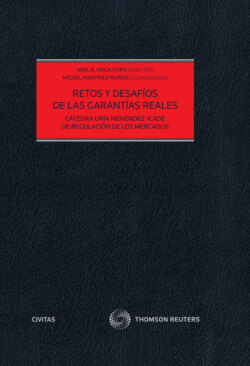Читать книгу Retos y desafíos de las garantías reales - Abel B. Veiga Copo - Страница 7
На сайте Литреса книга снята с продажи.
I. Introduction
ОглавлениеThis paper is concerned with the provision of credit by a creditor to a debtor in circumstances where the creditor may be said to have proprietary interest of sorts to add to the debtor’s personal undertaking to repay the loan. These expressions –creditor and debtor– are to be understood broadly to capture certain transactions that are hard to explain in terms of the advancement of credit in the conventional sense. For present purposes, credit will be taken to mean a form of financial accommodation1 that does not involve something that can be called a loan, yet gives the debtor a financial advantage akin to that offered by a loan. An obvious example is a conditional sale whereby a buyer obtains the use of goods prior to the completion of the sale without yet having to pay the price in full. A similar example is a finance lease where instalments are paid for the use of goods. A further example is where a factor purchases accounts receivable2, payable at a future date, at a price discounted to the present value of the receivables. Apart from credit, there is the proprietary interest that the provider of financial accommodation acquires or retains. This proprietary interest may consist either of a grant by the debtor of security over its assets or of a reservation or acquisition of ownership on the part of the creditor. The reservation of ownership is clearly not a matter of grant by the debtor, but the outright transfer of ownership that occurs when accounts receivable are discounted does amount to a grant, although it is not a grant that takes the form of a recognised type of security interest. The above division between security transactions and ownership transactions therefore does not map on to the distinction between what a provider of financial accommodation is granted and what it reserves.
It has become common to refer to ownership transactions that function as security, without being true security, as quasi-security. The principal focus of the paper is on the approach adopted by English law to true security and quasi-security, with its insistence on the maintenance of a conceptual and practical line between the two. English law has resisted the call of functional unity in the law of security, collapsing the distinction between true security and quasi-security, which elsewhere appears to be sweeping all before it3. It maintains this division, not just at the default (or remedies) stage but also when it comes to public notice by registration4. The division is also implicitly recognised when it comes to priority rules. Priority as used in this paper means not only the ranking of claims by competing creditors in a debtor’s assets; it also embraces the case where a debtor has no property rights in an asset to grant to the holder of true security because another creditor’s claim to assets in the possession of a debtor is based on ownership.
Apart from the attention paid to English law, extensive references will be made to UCC Article 9 and its various progeny, as well as to certain international instruments and initiatives that have addressed the distinction between security and ownership. At the heart of this paper lies the question whether the grant or retention of ownership has a particular quality that means that it cannot be folded into the same category as a security interest. Since English law has the appearance and reputation of being friendly to creditors seeking a proprietary addition to the debtor’s personal undertaking to make payment, I shall try to see how far and why this resistance to assimilation exists. In particular, the question to be faced by any supporter of the distinction between true security and quasi-security is this. If ownership is so special, how can that be justified in a legal system that treats ownership in relative terms, defined in terms of possession, and does not have a notion of absolute ownership? In English law, this feature of ownership is particularly prominent in the field of things in possession (tangible movables), hereinafter referred to as goods for the sake of convenience5. I shall start with a brief survey of the English law of security which need not detain those already familiar with the subject.
